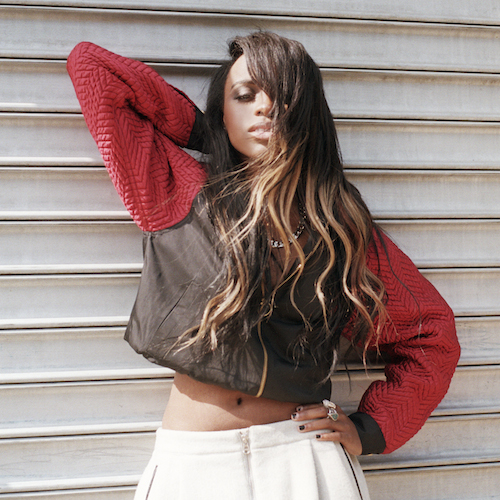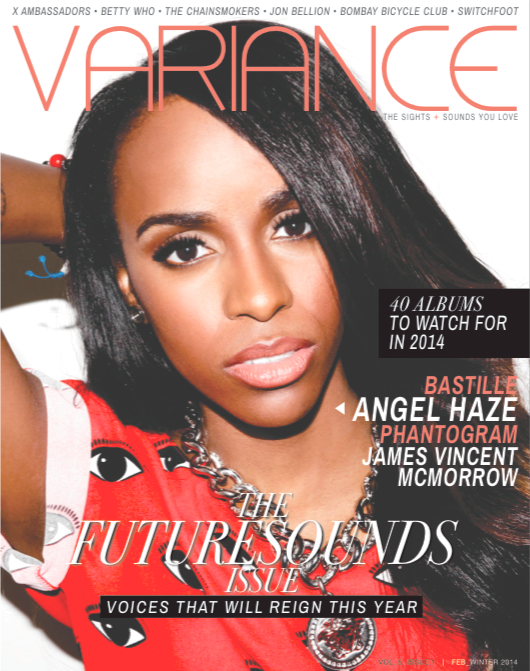
Editor's Note: This story appeared in its original format in the Winter 2014 issue of Variance. Click here for the full version.
It’s a cold afternoon in late November. Winter has made its way to the East Coast, and it’s starting to feel like the holidays, but Raykeea Angel Wilson (aka Angel Haze) is still busy working ahead of her debut album, Dirty Gold, believed at the time to be coming in March.
“It’s so close, I can’t believe it’s finally starting to become a reality,” the young songstress beams. “It’s one of those things you dream about, but to think that’s it’s actually time, it’s just unreal. It’s hard to wait.”
So she didn’t wait. Only days later, she took to Twitter in a fury and leaked her own album, slamming her label Island/Republic Records and declaring: "Since they don't want to put it out this year, I will. Here's the album. Here is Dirty Gold. I hope you all enjoy it.”
Of course, the leak was pulled down immediately. And the label opted to rush the album out officially on Dec. 30 instead of holding for March.
It didn’t take long for the opinions to roll in. Did Angel Haze really just do what M.I.A. and Kid Cudi had once threatened to do? Surely it was a career-killer. What was she thinking? Or maybe she just gave herself the best kind of PR. Maybe Beyoncé just got to her with that surprise album.
While there has been no shortage of critiques surrounding the “leak” and its aftermath, just days prior, the blogosphere was on fire, singing the rising MC’s praises. Her “30 Gold” cover series was a hit, offering renditions of Lana Del Rey and Miley Cyrus hits, among other seemingly left-field song choices.
“It was something I used to do before I was signed,” she reveals. “I told my manager, ‘I miss that. Putting out new freestyles everyday. It’d be fun to tap into that and do it again.’ I don’t think people expected me to be able to sing. And maybe I did it to prove something to them, but probably to prove something to me before the album. Because I’m not gonna lie, listening to it—the finished, real thing—I’m freaking the fuck out.”
At 22, perhaps Wilson is in some ways the victim of her own success. Not too long ago, she was working her way up in the game, just trying to catch someone’s—anyone’s—ear. 2012’s Reservation EP quickly established her as a force to be reckoned with, and her cover of Eminem’s “Cleanin’ Out My Closet” was met with applause. But the underground scene isn’t like the mainstream, and the rules are very different. So many rules.
Although Wilson has made clear before that her rap skills are competitive with better-knowns, and her passion has never been in question, the reality is that, despite her authentic desire to just make her music, the label’s trying to make a star.
 By now, fans know the formula: a feature here, a feature there, a single, a showcase, an EP, a cover and wait. Another song trickles out. Give it time to catch on, and then hopefully it’s album time.
By now, fans know the formula: a feature here, a feature there, a single, a showcase, an EP, a cover and wait. Another song trickles out. Give it time to catch on, and then hopefully it’s album time.
Dirty Gold is proof of that timeline. The fire’s there. The skill is evident. But it’s brimming with radio-ready, mainstream-friendly material, clearly aiming for Macklemore’s territory, with uplifting lyrics and anthemic choruses. And while it may seem outside of Wilson’s sphere to some, she’d actually like to collaborate with the “Same Love” rapper, whose song she brilliantly covered with her own personal experience.
“I struggled with wanting to cover that song,” recalls Wilson, who is openly queer. “I’m fairly moderate about imposing my own views upon other people. I like to give everyone a chance to think for themselves, and that’s pretty much it for me. But I know that struggle and when I hear from kids about how much they hated being gay or they hated being different, it struck me. I feel like, if I have been given a platform, this is a chance for me to say something and use it for good. It’s a chance for me to add my voice, as someone who’s actually been there myself, letting people know, ‘Here’s why you shouldn’t worry, because it will get better.’”
While Macklemore has been criticized for rapping about marriage equality as a straight man, Wilson doesn’t see the problem. In fact, she encourages more of it.
It has to be important for people to speak out, regardless of who you are or how you identify yourself. Black, white, straight, trans, it doesn’t matter. Someone has to say something.
“I get why people didn’t like it,” she admits. “But I don’t know if I see it like that. It has to be important for people to speak out, regardless of who you are or how you identify yourself. Black, white, straight, trans, it doesn’t matter. Someone has to say something. And more importantly is actually doing something, taking action. It’s not just talking. But with anything, why would you want less voices? What we need is more.”
It’s clear from the young star’s fervency that she isn’t fond of voices being silenced, which is understandable. But only days before Wilson talked to Variance, an interesting thing—at least, in hindsight—happened. Azealia Banks, who’s frequently mentioned alongside Wilson thanks to their highly publicized diss track war, took to Twitter in a rage.
Banks, who’s quite familiar with Twitter feuds, had called out Pharrell Williams for his lack of support for their collaboration “ATM Jam,” and she blamed her label for delaying her long-forthcoming debut album.
“I don’t understand all that,” says Wilson in reference to Banks’ rant. “I know I’m not in a position to criticize and I’m not trying to give my two cents in regards to her anyway, but there has to be a better way. I just can’t see myself doing that.”
That’s not to say it’s easy for a young artist—or any artist, for that matter—to deal with a major label, as Wilson quickly acknowledges.
“I’ve only ever actively had a problem with one person and very instantly regretted that,” she admits. “I try not to be a person who’s putting out negative energy. And if I feel that my album is being delayed and it’s not my fault, I have to try to understand where they’re coming from. And I’ll be honest, that’s hard. So I get that. I really like Republic. I love my label. And they’ve given me the freedom that I’ve needed. But everything’s not perfect. You as an artist have a vision, and it’s not easy sometimes to accept that not everyone will see what you see. They might have their own vision, but it’s not yours.”
LISTEN: Angel Haze's "Battle Cry" Featuring Sia
While Wilson’s battle over her vision versus the label’s might be an ongoing one, she recently earned the praise of one of her idols, Missy Elliott, who encouraged her to press on. And despite the flawed album release, there’s plenty for Wilson to be inspired by.
“One of the things I love about rap is how your peers push you to work harder and be better,” she says. “I mean, look at Kendrick Lamar. If we’re talking about the rap game right now, I don’t think there’s many people outdoing him at the moment. That’s just how it is. Of course, Eminem just dropped his album, and hands down, Eminem ranks over anyone. Period. And those guys inspire me. They push me to try just a little more.”
With a shaky launch into the mainstream spotlight, Wilson’s latest chapter will be a curious one to maneuver through, but if she remains true to herself, she knows she’ll be fine.
“I want to be known for my honesty, and my relentlessness,” she reveals. “It’s who I am as a person and it’s part of the message that I have. I want people to know that, even if you piss some people off, you can be who and whatever the hell you want. That’s what my story is about. A person who comes from the fucking dirt who believes you can aspire to be something better. I know I’m not there yet, and I’m still growing.
“But I still want to be more. I know I’m not perfect, but I’ve poured my heart into this music. That’s the most important thing to me, is just to spread that hope. Someone out there needs to know that they’re valuable and that they can make it. When you have that on your conscience, you just can’t ignore that. You just can’t.”



